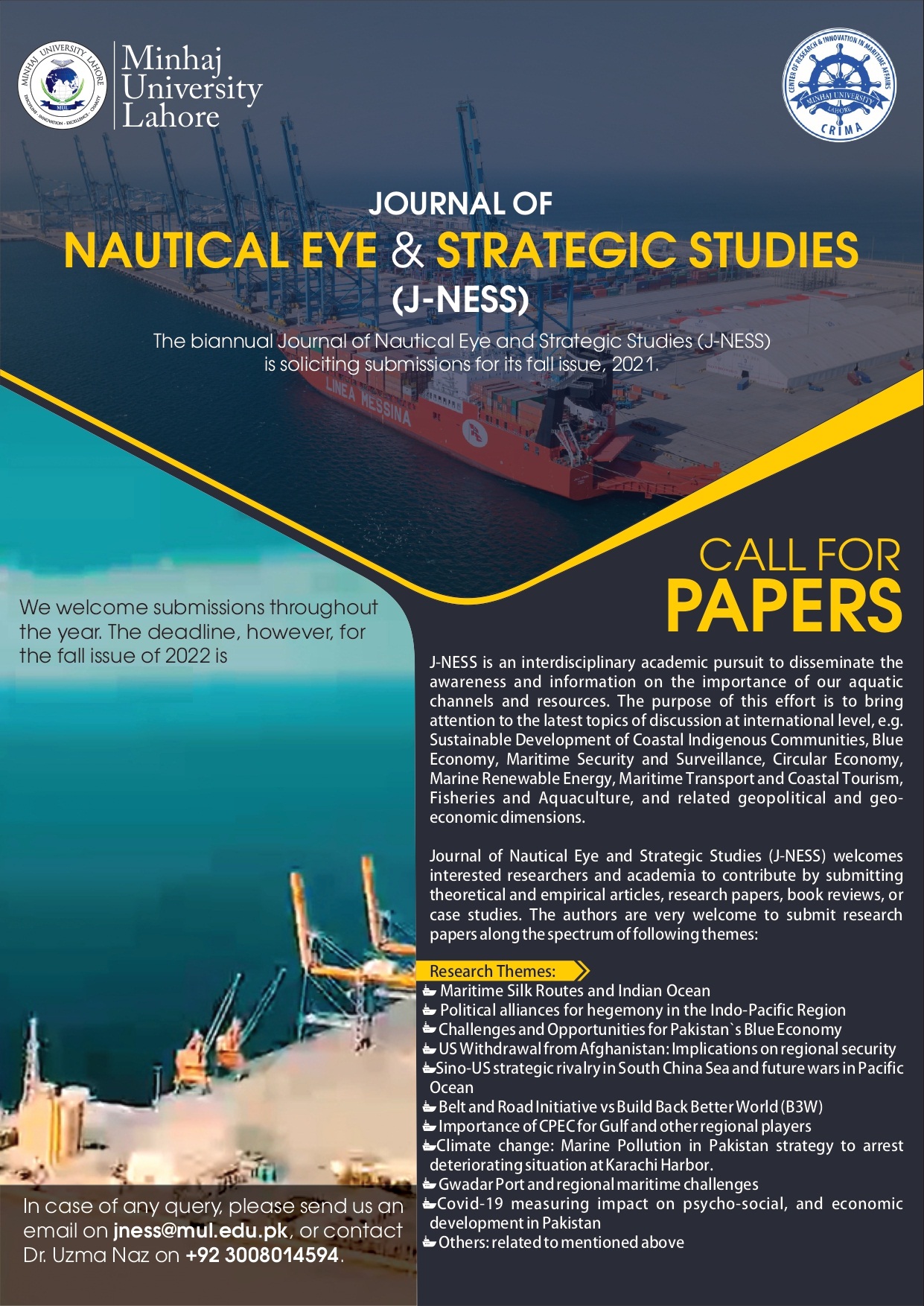Post-Covid Scenario of Container Market: Impact of The Scarcity of Empty Shipping Containers Over High Prices of Commodities In the Global Supply Chain Environment
DOI:
https://doi.org/10.58932/MULG0021Keywords:
Container market, container scarcity, global supply chain, maritime supply chain, post COVID scenario, high prices of commoditiesAbstract
Seaborne trade, particularly containerized trade, was expected to suffer a significant decline at the outbreak of the coronavirus of the 2019 (COVID-19) pandemic. Due to the reason that supply chains are obliged to import various items and resources from China to meet consumer demand for commodities such as medical equipment, home office supplies, and computer equipment. As China recovered from months of trade suspension, an imbalance was developed, with the country sending around three containers for every one imported. Furthermore, the container crisis reflects a slowdown and delays in the maritime supply chain because of pandemic-related strains, such as port labor shortages, port congestion (also due to blank sailings), and capacity constraints in the truck and other inland transportation systems. Due to a lack of empty containers, backlog at ports resulted in freight prices surpassing record highs by the end of 2020 and early in 2021. The surge in freight prices was felt in various developing countries, including Africa and Latin America. As a result, shipping and container rates skyrocketed, resulting in prolonged delays for businesses, the total cost of ownership (TOC), and thus the price of commodities. Therefore, this paper emphasizes over repercussions of constraints on the whole maritime supply chain and propose measures for dealing with potential future container shortage.
References
Ayaz, İ. S., Bucak, U., & Mollaoglu, M. Resilience Strategies of Ports Against Covid-19 in Terms of Chaos Theory: An Exploratory Study of Turkish Container Ports. Available at SSRN 4049769.
Chaudhary, A. (2022, April 13). 500 ships stranded outside Chinese ports due to zero covid policy. The Maritime Post. Retrieved January 29, 2023, from https://themaritimepost.com/2022/04/500-ships-stranded-outside-chinese-ports-due-to-zero-covid-policy/
Chengevelyn. (2021, November 19). Surging shipping costs will drive up prices for some consumer products by 10%, new UN report finds. CNBC. Retrieved January 29, 2023, from https://www.cnbc.com/2021/11/19/surging-shipping-costs-to-drive-consumer-price-inflation-unctad says.html utm_term=Autofeed&utm_medium=Social&utm_content=Main&utm_source=Twitter#Echobox=1637295016
China exports spike to highest in decades after covid-19 hit. The Economic Times. (n.d.). Retrieved January 29, 2023, from https://economictimes.indiatimes.com/news/international/business/china-exports-spike-to-highest-in-decades-after-covid-19-hit/articleshow/81374582.cms?from=mdr
Chip shortage? now it's a ship(ping container) shortage. The National Law Review. (n.d.). Retrieved January 29, 2023, from https://www.natlawreview.com/article/chip-shortage-now-it-s-shipping-container-shortage
Cudahy, B. J. (2007). Box boats: How container ships changed the world. Fordham Univ Press.
Danelia, I. (2021). Impact of COVID-19 on global container shipping industry. European Scientific Journal, ESJ, 17, 27.
Global shipping snarls leave Chinese exporters sweating ahead of Christmas. South China Morning Post. (2021, October 5). Retrieved January 29, 2023, from https://www.scmp.com/economy/global-economy/article/3151133/china-shipping-container-shortages-leave-exporters
Hanlon, M. (2010). The cargoshell: Ingenious collapsible replacement for the standard shipping container. 2010-01-06)[2014-10-15]. http://www. gizmag. com/the-cargoshell-inge-nious-collapsible-replacement-for-the-standard-shipping-container/13736.
Impact of covid-19 on socioeconomic situation of Pakistan. (n.d.). Retrieved January 29, 2023, from https://finance.gov.pk/survey/chapters_21/Annex%20IV%20Covid.pdf
Jahn, M. (2022, November 10). Which country is the largest exporter of goods in the world? Investopedia. Retrieved January 29, 2023, from https://www.investopedia.com/ask/answers/011915/what-country-worlds-largest-exporter-goods.asp
Ke, X., Zhou, H., Jin, N., Wan, X., & Zhao, J. (2008, December). Establishment of containers management system based on RFID technology. In 2008 International Conference on Computer Science and Software Engineering (Vol. 6, pp. 329-331). IEEE.
Khan, A. S. (2020, December 30). Supply chains choke as container shortage persists. DAWN.COM. Retrieved January 29, 2023, from https://www.dawn.com/news/1598612
Kim, T., & Glock, C. H. (2014). On the use of RFID in the management of reusable containers in closed-loop supply chains under stochastic container return quantities. Transportation Research Part E: Logistics and Transportation Review, 64, 12-27.
Konings, R., & Thijs, R. (2001). Foldable containers: a new perspective on reducing container-repositioning costs. European journal of transport and infrastructure research, 1(4).
Lapena, D. (2022). The Impact of the Covid-19 Pandemic on Distribution Logistics.
Lapshin, A. (2022, June 7). Solving empty container repositioning problem with ai. Transmetrics. Retrieved January 29, 2023, from https://www.transmetrics.ai/blog/empty-container-repositioning/
Levinson, M. (2016). The Box: How the Shipping Container Made the World Smaller and the World Economy Bigger - Second Edition with a new chapter by the author (REV-Revised, 2). Princeton University Press. https://doi.org/10.2307/j.ctvcszztg
Mulhern, B. (2021, March 23). An 'aggressive' fight over containers is causing shipping costs to rocket by 300%. Prolink. Retrieved January 29, 2023, from https://prolink.ie/an-aggressive-fight-over-containers-is-causing-shipping-costs-to-rocket-by-300/
Notteboom, T., Pallis, T., & Rodrigue, J. P. (2021). Disruptions and resilience in global container shipping and ports: the COVID-19 pandemic versus the 2008–2009 financial crisis. Maritime Economics & Logistics, 23, 179-210.
Ou, X., Arinez, J., Chang, Q., & Xiao, G. (2017). Cost analysis and fuzzy control for collapsible container usage based on closed-loop supply chain model. Journal of Manufacturing Science and Engineering, 139(8).
Slack, B. (2004). Corporate realignment and the global imperatives of container shipping. In Shipping and ports in the twenty-first century (pp. 47-61). Routledge.Youd, F. (2022, June 22). Global Shipping Container Shortage: The story so far. Ship Technology. Retrieved January 29, 2023, from https://www.ship-technology.com/features/global-shipping-container-shortage-the-story-so-far/
Song, D. P., & Dong, J. X. (2015). Empty container repositioning. Handbook of ocean container transport logistics: making global supply chains effective, 163-208.
Team, M. (2021, March 14). The 'domino effect' of container shortage distorts the supply chain. mfame.guru. Retrieved January 29, 2023, from https://mfame.guru/the-dominoeffect-of-the-container-shortage-distorts-the-supply-chain/
The impact of the COVID-19 pandemic on Freight Transportation Services and U.S. merchandise imports. The Impact of the COVID-19 Pandemic on Freight Transportation Services and U.S. Merchandise Imports | United States International Trade Commission. (n.d.). Retrieved January 29, 2023, from https://www.usitc.gov/research_and_analysis/tradeshifts/2020/special_topic.html
Downloads
Published
How to Cite
Issue
Section
License
Copyright (c) 2023 Journal of Nautical Eye and Strategic Studies

This work is licensed under a Creative Commons Attribution-NonCommercial 4.0 International License.











